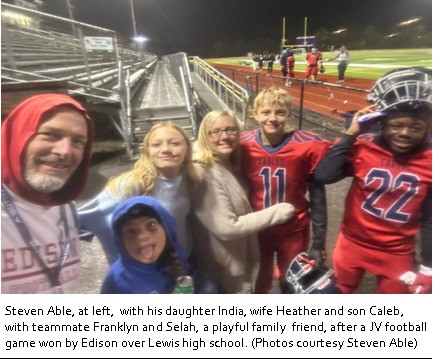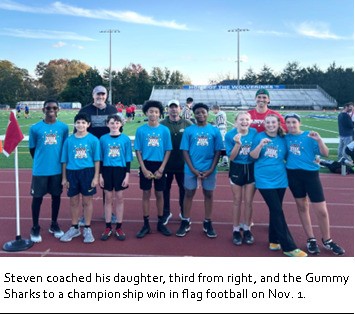Steven Able: What It Means To Be a Coach
The Reverend Billy Graham once said, “A coach will impact more people in one year than most do in a lifetime.” The question of course is, what kind of impact will that coach have?
A big part of my life has been spent in the local youth and high school sports scene in Northern Virginia and specifically in Franconia. My sports experience started with Pioneer T-ball at Lee District Park (now Franconia Park) in 1981 with my dad as one of my coaches. I also played soccer and basketball while in middle school and even made the All-Star team in the 7th and 8th grade.
At Hayfield High School, however, my dreams of athletic glory ended abruptly when I tried out for JV basketball and was cut. That experience forced me to reconsider my identity as an athlete but also set the stage for a career in coaching.
I came to believe that my identity was in who God said I was. I began to focus less on performance and more on character.
Despite not having played any sports in high school, I was able to play one year of D3 college basketball. Along the way, I found I had a knack for teaching and even took a part-time job coaching JV basketball. I also led a basketball instruction clinic and coached a church youth team. I wasn’t the greatest coach, but I really enjoyed the process of teaching and learning.
A big part of my life has been spent in the local youth and high school sports scene in Northern Virginia and specifically in Franconia. My sports experience started with Pioneer T-ball at Lee District Park (now Franconia Park) in 1981 with my dad as one of my coaches. I also played soccer and basketball while in middle school and even made the All-Star team in the 7th and 8th grade.
At Hayfield High School, however, my dreams of athletic glory ended abruptly when I tried out for JV basketball and was cut. That experience forced me to reconsider my identity as an athlete but also set the stage for a career in coaching.
I came to believe that my identity was in who God said I was. I began to focus less on performance and more on character.
Despite not having played any sports in high school, I was able to play one year of D3 college basketball. Along the way, I found I had a knack for teaching and even took a part-time job coaching JV basketball. I also led a basketball instruction clinic and coached a church youth team. I wasn’t the greatest coach, but I really enjoyed the process of teaching and learning.

Over the years I’ve learned a lot, both by trial and error, by professional development, and by being around some great coaches. Here’s what I believe are the core tenets of what it means to be a coach:
This is why I coach. While I’m nowhere near perfect, I strive to be a good example to my athletes, and to other coaches, and pull others up along the way.
If you are like me, we could use you out there coaching. There are a lot of volunteer coach opportunities in the area, including Pioneer Youth Baseball and Lee Mount Vernon Sports Club.
Steven Able represents the Fellowship of Christian Athletes and works with coaches and athletes at seven public schools in Fairfax County, including Edison High School.
- Care for your athletes and their families. We need good people more than good athletes. There’s a great book called “Inside Out Coaching” where the Head Coach of high schoolers is asked how his team is looking. He responds, “I’ll tell you in 20 years.” He was more concerned with the type of adults they became than the athletes they were.
- Integrity. What is the transformation you want to see? Make sure the goals you set are good and then ask yourself: “Does what I say and do in practice, and in games, actually lead toward these goals?”
- Intentionally teach character. Sports don’t automatically teach it. There are too many stories of successful athletes with character problems.
- Pursue excellence. While perfection is impossible, excellence is not. Details matter. Lead by example and expect your athletes to do the same.
- Become an excellent observer and expert communicator. I see coaches get frustrated or experience less than great results because their observations are inaccurate or their communication isn’t as clear as they think it is.
- Know what to control. You can’t control everything. Sometimes you might even impede progress by trying to control everything. Learn what needs to be controlled, and what doesn’t. Get input from others. Your own perspective is often limited.
- Have fun. You can get more from athletes when something is fun. Be creative on how to keep things fun.
This is why I coach. While I’m nowhere near perfect, I strive to be a good example to my athletes, and to other coaches, and pull others up along the way.
If you are like me, we could use you out there coaching. There are a lot of volunteer coach opportunities in the area, including Pioneer Youth Baseball and Lee Mount Vernon Sports Club.
Steven Able represents the Fellowship of Christian Athletes and works with coaches and athletes at seven public schools in Fairfax County, including Edison High School.

Recent
Rose Hill Resident Launches Urban Farm Business To Cultivate Honey and Wildlife Connections
February 21st, 2026
Rose Hill Civic Association Meeting on Tuesday, January 27 Cancelled
January 26th, 2026
Steven Able: What It Means To Be a Coach
November 26th, 2025
Chain of Small Miracles: How CPR, Community and Perfect Timing Saved my Dad
November 20th, 2025
How We Fixed a Shifting Foundation at our Home on Carriage Dr.
May 29th, 2025
Archive
2026
2025
2024
May
2023
August
October
November
Categories
no categories